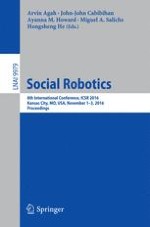2016 | OriginalPaper | Chapter
A Study on Trust in a Robotic Suitcase
Authors : Beatriz Quintino Ferreira, Kelly Karipidou, Filipe Rosa, Sofia Petisca, Patrícia Alves-Oliveira, Ana Paiva
Published in: Social Robotics
Publisher: Springer International Publishing
Activate our intelligent search to find suitable subject content or patents.
Select sections of text to find matching patents with Artificial Intelligence. powered by
Select sections of text to find additional relevant content using AI-assisted search. powered by
